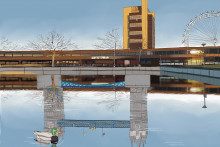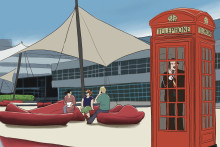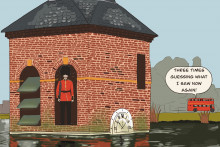On June 14 2018, with the courthouse in Utrecht as the backdrop, the association Beter Onderwijs Nederland (BON) engages in a legal battle with Maastricht University, the University of Twente and the Inspectorate of Education. According to BON, the UT and Maastricht University stand out as bad examples where the use of the English language as the main language has gone too far. BON wants the court to prohibit both universities from changing Dutch-taught programmes to English-taught programmes and order them not to apply and further Anglicisation in policy and administration for one year. And so, philosopher Ad Verbrugge and the UT’s president of the Executive Board Victor van der Chijs stand diametrically opposed to each other for well over a year and a half before the Buitenhof episode.
Dutch, unless
Dividing issues in the courtroom are two articles within the Dutch law on higher education and scientific research. The guiding principle of this law is: ‘Dutch unless’. But the ‘unless’ is exactly the reason for the difference in opinion between BON and the UT. Because when exactly is the use of English justified? It develops into a passionate speech against legal arguments. Where BON prefers a heated plea in court, the UT lawyers in particular take a different approach. As a result, it becomes a legal battle, in which the lawyers deem the Utrecht preliminary relief judge to be incompetent to rule on the case and BON itself is not ‘admissible’ because it had not entered into discussions with the universities before the interim proceedings were initiated.
In the end, the universities win the lawsuit. Leaving aside the box of legal tricks, the campus is 'anglicising' little by little. Remarkably enough, the initiative often comes from the UT community itself. For example, representatives of the study associations were flocking to De Vleugel to present a manifest to the Executive Board at the start of 2018. The associations want the main language in the association rooms and during their events to be English, just like all written communication. And the anglicisation is also visible in the names that are used. For example, the faculty ‘Construerende Technische Wetenschappen’ becomes Engineering Technology, the ‘Taal Coördinatie Punt’ becomes the UT Language Centre, ‘Conferentiehotel Drienerburght’ becomes the U Parkhotel and even the written press has to adapt: ‘UT Nieuws’ becomes U-Today mid-2017 and offers more and more articles in English – or bilingual.
'We even went to the monastery in Vught to get lessons in English from the nuns'
Lessons from the nuns
But what exactly is the language policy of the UT? It should be in force from the 1st of January 2018, like once conceived in 2015, right? Things are not going that fast, but all kinds of parties within the UT are making the switch to English – whether or not with enthusiasm. Take Studium Generale as an example, which currently offers more English than Dutch lectures. ‘We are now giving almost 70 per cent of lectures in English’, says head of Studium Generale Peter Timmerman. ‘But we are trying to balance it out a bit more; fifty-fifty is our aim. After all, we also try to reach people from within the region, which you do scare off with English.’
The switch to English was not imposed on Studium Generale ‘from above’, Timmerman is adamant about that. ‘No no no. Fortunately not. What does happen is that everything and everyone is moving along with that large movement that the university is deploying. We are no exception to that. And let me emphasise: there is certainly something inspiring about the international dynamic. All those different perspectives, I find it refreshing and interesting. And it is fun to occupy yourself with language. We even went to the monastery in Vught to get lessons in English from the nuns. We completely immersed ourselves in another language for a weekend. It was very intensive, but it worked.’
'You do notice that language plays a role in whether a story resonates with the audience'
Poorly fitted suit
And yet, Studium Generale had to find its way with the language. ‘On a personal note: it does not feel like my mother tongue. No matter how hard I try, I am not going to feel at home in it. I will always be a guest in English’, says Timmerman. And what it meant for the Studium Generale program of speakers? ‘Sometimes the trade-off is dead simple. Interviewing a renowned Dutch author like Peter Buwalda in English is like turning the world upside down. But often it is a grey area. In 2018, we invited Joris Luyendijk to talk about Brexit. You would say: that is eminently an international subject and Luyendijk worked in England for a while, so it is perfectly possible in English. But afterwards, we were criticized that a Dutch journalist gave his lecture in English.’
The criticism also works the other way around. ‘For the sake of accessibility, especially for support staff, we held a debate about workload in Dutch last year. Afterwards, there was criticism from the PhD network P-NUT that workload is also an extremely relevant subject for PhD candidates. That is why we will soon have a debate about the workload of PhD candidates – in English.’
‘You can never really do it right’, is the sober conclusion that Timmerman draws. ‘I do not want to turn it into a romantic discussion, but you do notice that language plays a role in whether a story resonates with the audience, in what sticks. You notice it in the jokes, the anecdotes, the timing and the quips. And that language proficiency also differs per speaker, you will notice that when you experience it. A colleague once compared it to a poorly fitted suit. It all looks neat and representative, especially from a distance. But if you take a closer look, you will see that something just doesn’t feel right; too tight in one place, too loose in another.’
'You cannot really play around with language anymore'
‘Students are not calculators’
Civil Engineering lecturer Pieter Roos, who was named lecturer of the year at the UT in 2017, recognizes Timmerman’s words. ‘I can get by just fine during lectures, but you cannot really play around with language anymore. Language is also a tool for engagement. I often make use of word play and that is a bit more difficult in English.’ Language is crucial in exact sciences, argues Roos. ‘It is often said: technical subjects are about numbers and figures and nothing else. But language is a means of placing nuances. Often, laws only apply under certain circumstances and you have to discuss that. That is only possible with language.’
Sissi de Beer agrees. She is the program director at Applied Physics. ‘You need to know what numbers mean. Our students are not calculators. It is precisely this meaning that we can convey with language.’ According to De Beer, the informal part, in particular, the social interaction with students, is easier in Dutch. ‘And it is just as important. When I started giving lectures in Dutch again at Applied Physics a few years ago, I noticed that. ’ Nevertheless, English is not a problem for De Beer. ‘In the master for Chemical Science & Engineering, I give lectures in English. I get by fine, especially in the scientific part. My brain often does not even register whether I am speaking in English or Dutch. In some cases, speaking is even easier in English due to English terminology.’
The main language is Dutch at Applied Physics. It is an exceptional position at the UT, where most lectures are now given in English. But De Beer emphasises that not all subjects in Applied Physics are in Dutch. ‘I think that is a good situation. Students gradually learn the language through several English Bachelor’s courses, so that they are completely ready for the Master’s. I would certainly like to keep that language policy at Applied Physics. But I cannot judge that for other programs that are taught entirely in English.’
'The intensity of the interaction during lectures is under pressure'
Quality and intensity
UT lecturer Roos wonders whether the Bachelor’s is the right time to offer a program entirely in English. ‘For secondary school students, the step to university is a major transition, and then language is also added. Some students do not yet possess the proper needed English skills. I notice that they ask fewer questions during lectures and keep more to the background. As a result, the intensity of the interaction during lectures is under pressure.’ This does not only apply to students, he knows. ‘Colleagues, often from the somewhat older generation, sometimes also have difficulties with the English language and that affects the quality of a course.’
Anne Dijkstra, assistant professor in science communication, does not see English as the main language as a major hurdle. ‘Of course, I find it easier to speak in Dutch, and I have to think more often in English, but I do not think it comes at the expense of the quality of education. Our students, in my case Master's students and PhD's, simply have different backgrounds and that requires one language: English.’ Moreover, the specialist literature and teaching materials are in English, Dijkstra emphasizes. ‘My field of expertise is not limited to The Netherlands. Therefore, English is the logical main language. But when I discuss theses individually with Dutch students, we just do it in Dutch.’
‘Dirty, left-wing traitors’
And so, the UT community tries to find its way with the English language. And gradually, it seems that the applied measures are less severe than those announced. In the spring of 2018, in anticipation of the decision-making process regarding the UT’s language policy, President of the Executive Board Victor van der Chijs hinted that Dutch could still be spoken perfectly fine at the coffee machine. And nearing the summer of 2019, when the University Council actually votes on the language policy, the contours of the policy become even clearer: an inclusive university is a two-way street, Dutch UT students and staff speak English where it makes sense and international students and staff get extracurricular support to master the Dutch language. The University Council agreed to this with a large majority: the code of conduct for official languages comes into effect on the 1st of January 2020.
And exactly around that time, a storm arises from the outside world, at the moment that any language conflicts within the ‘walls’ of the campus have calmed down for a long time. The bone of contention is an article from the regional newspaper Tubantia, which leads to parliamentary inquiries and the communications department of the UT is faced with a barrage of angry tweets like ‘You only use words like inclusiveness and diversity to gain points’, ‘Dirty left-wing traitors’ and ‘At least I know where my children will not be going to study’. Less than a month later, Verbrugge and Van der Chijs face each other in Buitenhof. And how hot-tempered the sentiment of the outside world still is, is further emphasised by a group called the ‘Geuzenbond’, which poses with a banner at the main entrance of the UT.
As quickly as the storm arises, it’s as quickly it dies down again. Minister Van Engelshoven takes time until June 2020 to answer the parliamentary questions. In the meantime, members of the UT community – and the rest of the world – have other things on their mind when the Covid crisis causes total mayhem in March.
Friday, in our concluding part 3: why did the UT change to English so rigorously? And how are we doing anno 2023, now that external criticism is rising?






